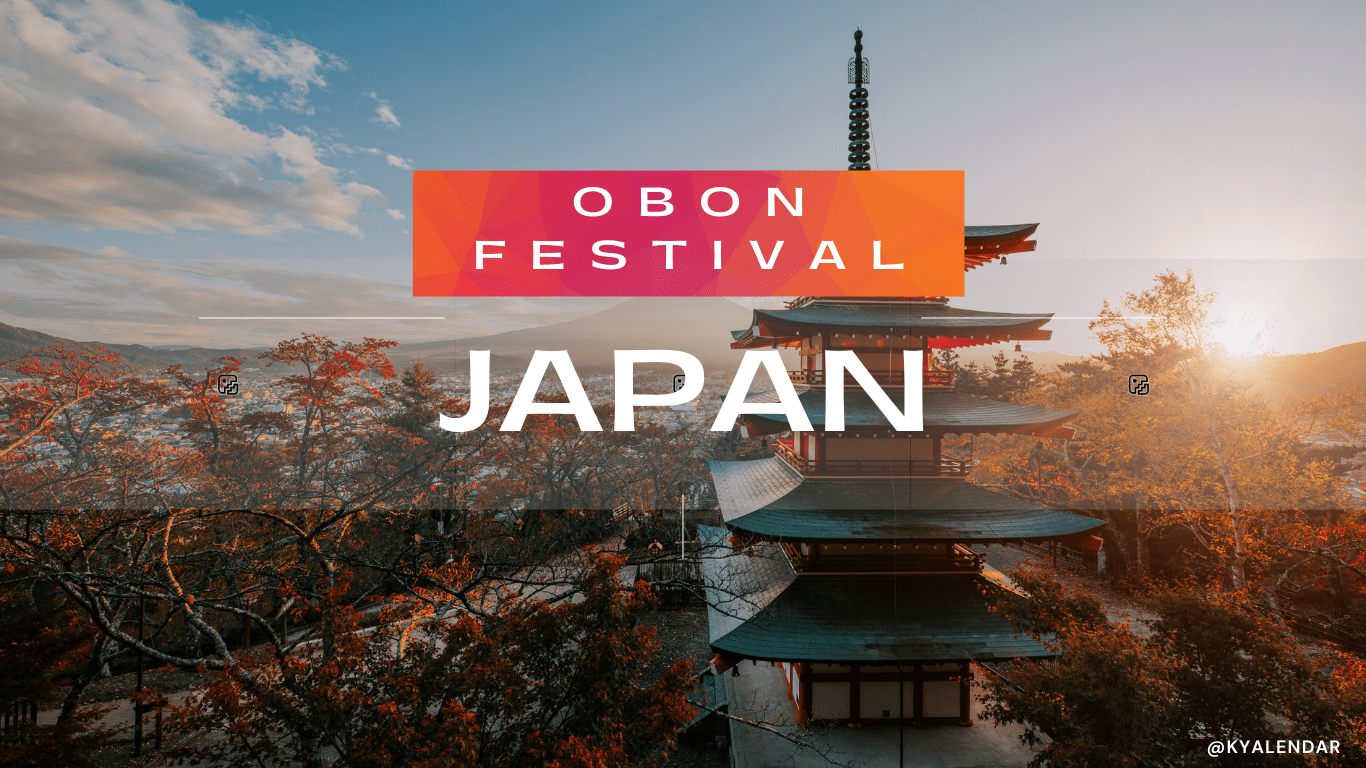
- This event has passed.
Obon Festival
August 13 - August 16

The Obon Festival, also known simply as Bon, is a traditional Buddhist event in Japan that honours the spirits of deceased ancestors. It is one of the most important annual festivals in Japan, typically celebrated in mid-August, though the exact dates can vary by region. The festival spans three days and is marked by various customs and rituals intended to welcome the spirits of the departed back to the world of the living, offer them respect, and then guide them back to the afterlife.
History:
The Obon Festival has its roots in Buddhist tradition and has been celebrated in Japan for over 500 years. The origins of Obon can be traced back to the story of Maha Maudgalyayana (Mokuren), a disciple of the Buddha. According to legend, Mokuren used his supernatural powers to look upon his deceased mother and discovered that she had fallen into the Realm of Hungry Ghosts, a place of suffering. Deeply saddened, Mokuren sought Buddha’s advice on how to alleviate his mother’s suffering. The Buddha instructed him to make offerings to Buddhist monks who had completed their summer retreat. After following Buddha’s instructions, Mokuren’s mother was freed from her torment, and he danced with joy. This dance of joy became the Bon Odori, a traditional dance that is a key element of Obon celebrations.
Over time, the Obon Festival evolved, blending Buddhist rituals with Japanese Shinto and folk traditions. It became a period for families to reunite, visit ancestral graves, and honour the spirits of their forebears.
Significance:
Obon is a deeply spiritual and cultural event that emphasises the importance of family, respect for ancestors, and the belief in the interconnectedness of the living and the dead. The festival reflects the Japanese view of life and death, where the spirits of ancestors are believed to influence the well-being of their descendants. Obon provides an opportunity for people to express gratitude to their ancestors for their inherited lives and to ensure the spirits are at peace.
The festival also reinforces the bond between the living and the dead, as it is believed that during Obon, the spirits of the deceased return to the earthly realm to visit their families. These visits are welcomed with rituals and offerings, ensuring that the spirits are treated with the utmost respect.
How to Celebrate:
Obon celebrations vary across Japan, but some common practices and rituals are observed nationwide:
1. Mukaebi (Welcoming Fires): On the first day of Obon, families light small fires called mukaebi at the entrances of their homes to guide the spirits of their ancestors back to the living world. Lanterns are also used for this purpose, often placed in front of the family altar.
2. Visiting Graves: A central aspect of Obon is visiting the family grave, where relatives clean the tombstones, offer flowers, incense, and food, and pray for the souls of their ancestors. This ritual is known as ohakamairi.
3. Bon Odori (Bon Dance): The Bon Odori is a traditional dance performed during Obon to welcome the spirits of the dead. The dance varies by region, but it generally involves simple, rhythmic movements performed in a circle. Participants often wear yukata (light summer kimono), and taiko drums and folk music accompany the dance. Bon Odori is both a spiritual and social event, bringing communities together in celebration.
4. Offering Food and Gifts: During Obon, families place offerings of food, drinks, and other gifts on the family altar or at the gravesite. These offerings are believed to provide sustenance to the visiting spirits.
5. Toro Nagashi (Floating Lanterns): On the final day of Obon, families participate in the Toro Nagashi ceremony, where paper lanterns are lit and set afloat on rivers, lakes, or the sea. This ritual is symbolic of sending the spirits back to the afterlife, guiding them with the light of the lanterns.
6. Obon Markets and Festivals: In many regions, local festivals and markets are held during Obon, where people can enjoy food stalls, games, and entertainment. These events add a festive atmosphere to the spiritual observance.
What People Do Around the World:
While Obon is primarily celebrated in Japan, Japanese communities around the world also observe the festival. In countries with significant Japanese populations, such as Brazil, the United States, and Canada, Obon celebrations include Bon Odori, memorial services, and community gatherings. These events help Japanese expatriates and their descendants stay connected to their cultural heritage.
In some areas, the festival has also evolved to include elements of local culture, making each Obon celebration unique to its region while maintaining the core traditions of honouring ancestors.
Conclusion:
The Obon Festival is a time of reverence, reflection, and family togetherness in Japan. It embodies the deep respect for ancestors that is central to Japanese culture and provides a spiritual connection between the living and the dead. The festival’s blend of solemn rituals and joyful celebrations highlights the Japanese belief in the cyclical nature of life and death. As families come together to honour their forebears, Obon serves as a poignant reminder of the importance of remembering and respecting those who have passed.
Related Information:
Obon is often referred to as the Japanese “Day of the Dead,” similar to other ancestor veneration traditions around the world, such as Mexico’s Día de los Muertos or China’s Qingming Festival. However, Obon’s unique blend of Buddhist, Shinto, and folk practices makes it distinct, offering a rich tapestry of customs that have been passed down through generations.